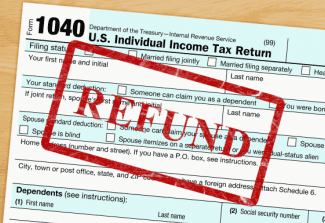4 Easy Ways to Boost Your Tax Refund, According to Experts
We’re well into tax season now, and that means it’s time to start prepping those tax returns.
While it’s typically not a fun task, there’s actually a silver lining this year: Many taxpayers can expect higher-than-average refunds. There are several reasons, but adjustments to federal tax brackets, larger standard deductions, higher interest rates and other factors all play a role.
“Inflation is actually helping taxpayers when it comes to their taxes,” says Lawrence Sprung, a certified financial planner and founder of Mitlin Financial. “The standard deduction, which is used by most, saw a significant increase for 2023. Tax brackets also saw a generous 7.1% increase. These two things combined will make it a more forgiving tax season for many.”
Want to boost your tax refund even more than these conditions allow? Below, we’ll break down how how experts say to do it.
4 easy ways to boost your tax refund, according to experts
Here are four simple ways to get a bigger tax refund according to the experts we spoke to.
Contribute more to your retirement and health savings accounts

“Those contributions will reduce your taxable income and hence your tax bill,” says Lei Han, a certified public accountant and professor of accounting at Niagara University.
You have until April 15 (tax day) to contribute to these accounts and write those contributions off on your 2023 tax returns. And while this approach will cost you cash upfront, the payoff is two-fold, says Wenyao Hu, a chartered financial analyst and professor at the New York Institute of Technology. “These actions not only support your future financial security but also can significantly reduce your taxable income,” Hu explains.
Choose the right deduction and filing strategy
While the standard deduction did increase this year, that doesn’t necessarily mean it’s the best choice for everyone. For some, itemizing your deductions may be a better way to go.
It’s important to run the numbers for both options to be sure you’re making the right choice. When doing so, make sure you’re factoring in often-forgotten deduction options, like student loan interest, medical expenses, and child and dependent care, too.
You should also carefully evaluate your filing strategy — particularly if you’re married.
“For married couples, there can be times when filing separately may yield a larger total net refund to the household than filing jointly,” says Rob Burnette, a professional tax preparer at Outlook Financial Center in Troy, Ohio. “Splitting returns will also impact state tax returns, so do the math on all of your returns.”
According to David Johnston, managing partner of Amwell Ridge Wealth Management in Flemington, New Jersey, your tax professional can help with these comparisons. And, if they don’t? “They’re not doing their job correctly,” Johnston says. “It should never be overlooked.”
Donate to charity
If you have a favorite charity, Hu recommends donating to them to increase your deductions. You can write off charitable contributions on your tax returns — up to 50% of your adjusted gross income — as long as you itemize.
These contributions can be monetary (as in you write a check to the charity), or they can be in the form of physical goods, too. For example, donating clothes or furniture to the Salvation Army could qualify you for a deduction. Just make sure you keep the donation receipt, as you’ll need it when filing your returns.
If you’re over 70.5 and have a traditional IRA, you can also use the IRS’s Qualified Charitable Distributions to reduce your taxable income and increase that refund. This lets you donate up to $105,000 of your IRA funds to a charity of your choice, rather than taking the agency’s required Qualified Minimum Distributions.
“The charity receives the full value of the donation, and the taxpayer avoids paying income tax on the distribution,” Burnette says. “This reduces Adjusted Gross Income and potentially lowers the amount of Social Security income that is taxable.”
Be organized and thorough
Finally, go into the tax filing process with all your ducks in a row. Have your income documents, receipts for any deductions, and statements from bank accounts and investments on hand.
“Don’t start doing your taxes until you have everything you need to file them, organized and ready to be entered,” Sprung says. “Missing just one piece of information could cause you to pay more taxes than you need to.”
You can also call in a pro for help. While they’ll certainly come with a fee, they’ll also be able to help you spot refund-boosting opportunities you might not have thought of. They can help you plan your future tax strategy, too.
What not to do
While there are several ways to increase your tax refund, there’s one all experts agree you should avoid: Adjusting your W-4 to pay more taxes on each paycheck. This would result in a bigger refund come tax season, but “you won’t have that money to live on during the year,” Johnston says.
It also amounts to giving the government an “interest-free loan,” experts say, and doesn’t serve to grow your wealth either. As Johnston puts it, “Overpaying Uncle Sam is not part of a sound financial plan.”
A better option? Put the extra money you considered withholding into something that earns you interest — like a certificate of deposit or high-yield savings account.
Tax preparation software can help
If you have a simple tax filing situation (you’re a W-2 employee, essentially), then tax preparation software — like TurboTax or TaxSlayer, for instance — can help you file your returns electronically come tax season. If you have more than one income source, own your own business, or are otherwise in a more complicated financial scenario, you’ll likely want a tax professional’s help. They can also help you handle any tax debt or explore options if you’re unable to cover your tax bill.
Source: CBS News















 Accessibility
Accessibility